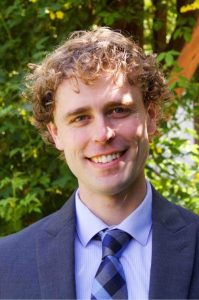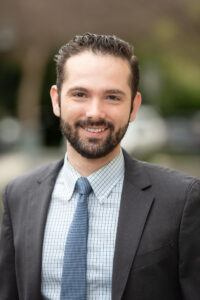Each week, S-SPIRE hosts a hybrid-model Work-In-Progress session (WIP) for faculty members and trainees to present their research and receive feedback. These run from September through May each year.
Our monthly WIP sessions (first Monday of every month) features Stanford and guest faculty presentations of well-developed projects. This WIP provides an opportunity to discuss high impact research and create synergy within the Stanford HSR/Surgery communities.
Presented by: Liam Rose, PhD
Talk Title: “Causal Inference with Observational Data”
Bio: Liam Rose is a health economist and investigator with the Health Economics Resource Center at VA Palo Alto. His research focuses on applied microeconomics with an emphasis on econometric techniques that can provide causal inference. His work focuses on access to care, utilization, and changes in health in the transitions to Medicare and retirement. Liam has a PhD in Economics from the University of California, Santa Cruz.
Each week, S-SPIRE hosts a Work-In-Progress session (WIP) for faculty members and trainees to present their research and receive feedback on projects in every phase of development—from drafting specific aims pages, to parsing grant review committee comments, to abstracts/papers/methods in preparation.
Please refer inquiries to Ana Mezynski at mezynski@stanford.edu
Presenter: Julian Howland, MD, Postdoctoral Fellow, S-SPIRE Center, Department of Surgery
Talk Title: “Latino Perspectives on Rectal Cancer Care: Results and Insights from the ACUeRDO Study”
Bio: Julian P. Howland, MD, is a postdoctoral fellow at Stanford University’s S-SPIRE Center, working within the Dawes Laboratory. He earned his MD from Stanford University and his BS from the University of Southern Maine. His research focuses on improving surgical management of inflammatory bowel disease and the experiences of Latino colorectal cancer patients in California.
Each week, S-SPIRE hosts an in-person Work-In-Progress session (WIP) for faculty members and trainees to present their research and receive feedback on projects in every phase of development—from drafting specific aims pages, to parsing grant review committee comments, to abstracts/papers/methods in preparation.
Anyone can attend and happy hour conditions apply here. Please refer inquiries to Ana Mezynski at mezynski@stanford.edu
Holman Abstract Practice Run by Department of Surgery Residents, Stanford University
Each week, S-SPIRE hosts a Work-In-Progress session (WIP) for faculty members and trainees to present their research and receive feedback on projects in every phase of development—from drafting specific aims pages, to parsing grant review committee comments, to abstracts/papers/methods in preparation.
Please refer inquiries to Ana Mezynski at mezynski@stanford.edu
Presented by: Peiqi Chen, Social Science Research Professional, S-SPIRE Center, Stanford University
Talk Title: “Implementing a Systematic Shield in EMR to Protect All: A Qualitative Analysis of Medical Expert’ Commentary on Universal Child Abuse Screening”
Bio: Peiqi Chen, M.A., B.A., is a Social Science Research Professional at the S-SPIRE Center. She holds a BA from the University of Iowa with a background in Sociology and Psychology. She also gained a certificate in Nonprofit Organization Management & Philanthropy. Currently she is still in her MA program in Social Science at the University of Chicago and writing a thesis about family planning policy evaluation on women’s maternity rights. At S-SPIRE, she assists with clinical researchers on qualitative data gathering and analysis. Before attending Stanford, she completed two internships at nonprofit organizations. She conducted research on social stigma toward COVID19 patient and front-line health workers during the pandemic. Her research interests lie in between sexual health, policy outcomes evaluation, and social welfare improvement for underrepresented population.
Each week, S-SPIRE hosts a Work-In-Progress session (WIP) for faculty members and trainees to present their research and receive feedback on projects in every phase of development—from drafting specific aims pages, to parsing grant review committee comments, to abstracts/papers/methods in preparation.
Please refer inquiries to Ana Mezynski at mezynski@stanford.edu
Presented by: Heather Selby, PhD, Postdoctoral Scholar, S-SPIRE Center, Department of Surgery, Stanford University.
Talk Title: “Enhancing the accuracy of tumor response assessment in rectal cancer using radiomics: Insights from the SFX Trial”
Bio: Heather Selby is a postdoctoral scholar at the S-SPIRE Center in the Stanford Department of Surgery. She is advised by Dr. Arden Morris, Dr. Todd Wagner, Dr. Sandy Napel, and Dr. Vipul Sheth. Her research focus is building MRI-based AI models to identify patients with locally advanced cancer patients who achieve a clinical complete response to neoadjuvant chemoradiotherapy to spare them from surgery and its associated risks.
Each week, S-SPIRE hosts a hybrid-model Work-In-Progress session (WIP) for faculty members and trainees to present their research and receive feedback. These run from September through May each year.
Our monthly WIP sessions (first Monday of every month) features Stanford and guest faculty presentations of well-developed projects. This WIP provides an opportunity to discuss high impact research and create synergy within the Stanford HSR/Surgery communities.
Each week, S-SPIRE hosts a Work-In-Progress session (WIP) for faculty members and trainees to present their research and receive feedback on projects in every phase of development—from drafting specific aims pages, to parsing grant review committee comments, to abstracts/papers/methods in preparation.
Please refer inquiries to Ana Mezynski at mezynski@stanford.edu
Presented by: Sun Young Jeon, Senior Health and Data Lead, Population Health Sciences.
Talk Title: “Adapting to CMS Policy Changes: What Medicare/Medicaid Researchers Using PHS Data Should Expect”
Each week, S-SPIRE hosts a Work-In-Progress session (WIP) for faculty members and trainees to present their research and receive feedback on projects in every phase of development—from drafting specific aims pages, to parsing grant review committee comments, to abstracts/papers/methods in preparation.
Please refer inquiries to Ana Mezynski at mezynski@stanford.edu

Presented by: Arden Morris, MD, Robert L. and Mary Ellenburg Professor of Surgery, and Professor, by Courtesy, of Health Policy.
Director and Vice Chair of Clinical Research, S-SPIRE Center.
BIo: Arden M. Morris, MD, MPH is Professor of Surgery and Vice-Chair for Research in the Stanford Department of Surgery. She is Director of the S-SPIRE Center, a health services research collaborative to study patient-centered care, clinical optimization, and health care economics. In her own work, Dr. Morris uses quantitative and qualitative research methods to focus on quality of and equity in cancer care. She serves as vice-chair of the Commission on Cancer’s National Accreditation Program for Rectal Cancer Quality Committee, American Society of Colon and Rectal Surgeons’ representative to the American Joint Commission on Cancer, and Chair of the ACS Cancer Surgery Standards Program Implementation and Integration Committee.

Presented by: Clifford Sheckter, MD, Assistant Professor of Surgery, Plastic and Reconstructive Surgery, Stanford University.
Bio: Dr. Cliff Sheckter is a California native, growing up in the rural Eastern Sierra. He graduated from UCLA with a BS in Anthropology and earned summa cum laude and Phi Beta Kappa honors. He attended USC (Keck) for medical school on an academic scholarship and graduated valedictorian with Alpha Omega Alpha honors. He fell in love with burn care while at USC/LA General Medical Center and completed his surgical training at Stanford. While in residency, he pursued a fellowship/postdoc in Health Systems Design at Stanford’s Clinical Excellence Research Center (CERC). He earned an MS in Health Policy from Stanford, focusing on health economics. He received additional training in Surgical Critical Care and Burn Surgery at the University of Washington.





